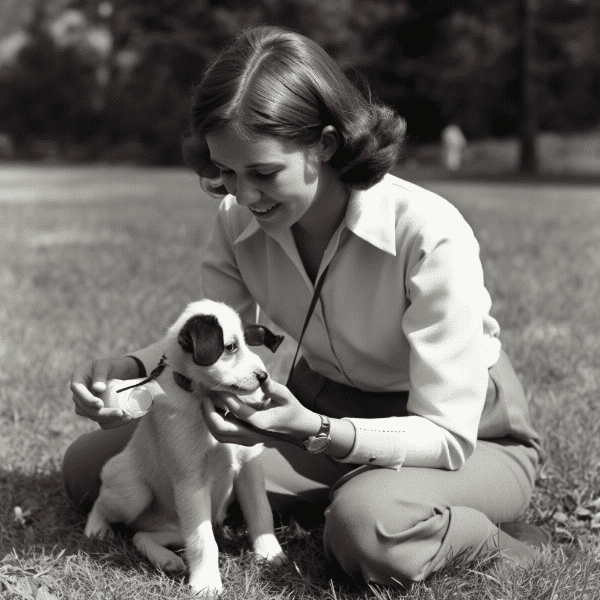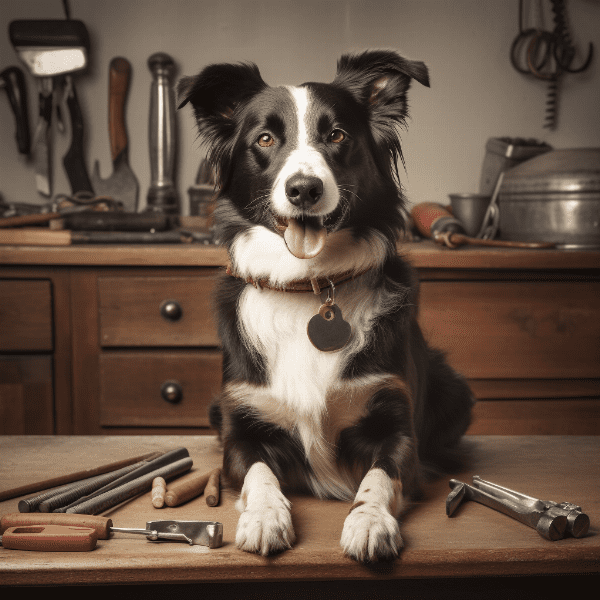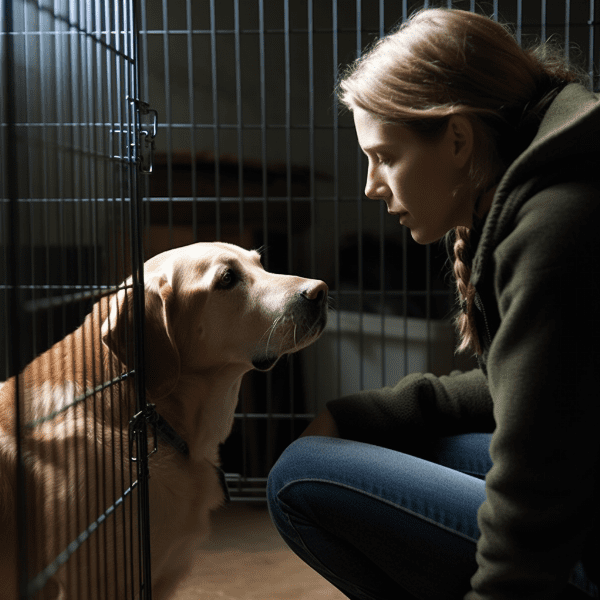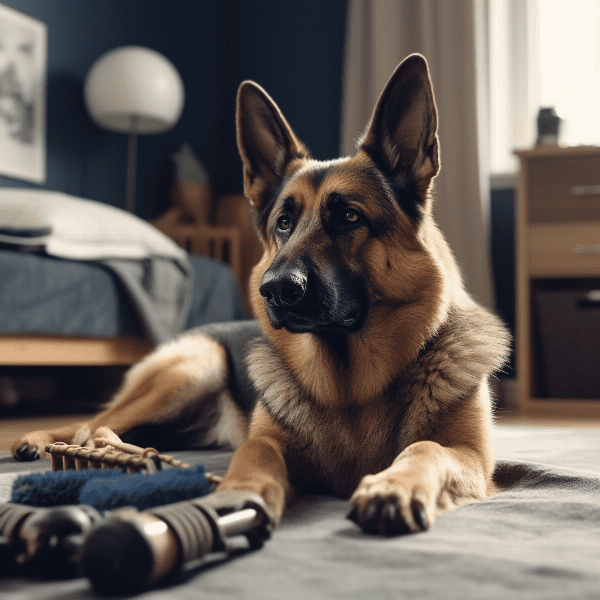Table of Contents
- What is Separation Anxiety in Puppies?
- Common Signs of Separation Anxiety in Puppies
- Causes of Separation Anxiety in Puppies
- Prevention Tips for Separation Anxiety in Puppies
- Training Techniques for Puppies with Separation Anxiety
- Medical Treatment for Puppies with Separation Anxiety
- Coping with Separation Anxiety: Tips for Puppy Owners
- Understanding the Impact of Separation Anxiety on Puppies
- Seeking Professional Help for Puppies with Separation Anxiety
What is Separation Anxiety in Puppies?
Separation anxiety is a common behavior problem that many puppies experience when they are left alone or separated from their owners. It is a psychological condition that can cause a range of symptoms and behaviors, from mild to severe.
Understanding the Psychology of Separation Anxiety
Puppies are social animals and they naturally form strong bonds with their owners. When left alone, some puppies may experience a sense of fear or abandonment. Separation anxiety is a result of this fear and can cause your puppy to feel anxious, stressed, or even panicked.
Symptoms of Separation Anxiety in Puppies
Puppies with separation anxiety may display a variety of behaviors that indicate their distress when left alone. These behaviors can include excessive barking, howling, destructive chewing, digging, and scratching. Some puppies may also become anxious and restless, pacing around the house, or hiding when they sense that their owner is about to leave.
When Does Separation Anxiety Develop in Puppies?
Separation anxiety can develop in puppies as early as eight weeks old. However, it can also develop later in life, particularly if the puppy has experienced a traumatic event or has been exposed to changes in their routine or living environment.
Differentiating Separation Anxiety from Other Behaviors
It’s important to differentiate separation anxiety from other behaviors that puppies may display when left alone. For example, it’s normal for puppies to whine or cry for a short period when first left alone. However, if your puppy continues to display these behaviors after an extended period, it may be a sign of separation anxiety. Other behaviors, such as chewing on furniture or shoes, may simply be a sign of boredom or a lack of appropriate chew toys.
In conclusion, separation anxiety is a common problem that many puppies experience when left alone. It’s essential to understand the psychology behind this condition and how it can manifest in your puppy’s behavior. By identifying the symptoms and underlying causes of separation anxiety, you can take steps to help your puppy feel more secure and confident when you’re not around.
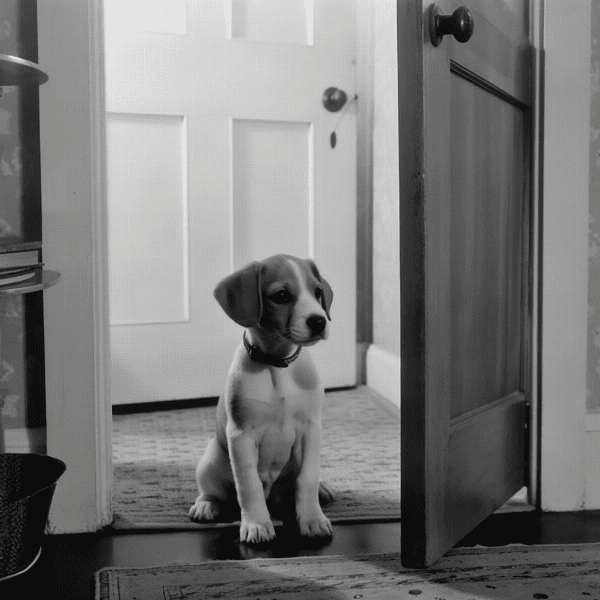
Common Signs of Separation Anxiety in Puppies
As a responsible puppy owner, it’s important to be aware of the common Signs of separation anxiety in puppies. By recognizing these signs, you can take steps to help your puppy overcome their anxiety and feel more secure when left alone.
Vocalization
One of the most common signs of separation anxiety in puppies is vocalization. Puppies with separation anxiety may bark, howl, or whine excessively when left alone or when they sense that their owner is about to leave. This is their way of expressing their fear and distress.
Destructive Behavior
Puppies with separation anxiety may also engage in destructive behavior, such as chewing on furniture, shoes, or other household items. This behavior can be a way for your puppy to cope with their anxiety and release their nervous energy.
Pacing and Restlessness
Restlessness and pacing are also common signs of separation anxiety in puppies. Your puppy may appear anxious and unsettled, moving from room to room in the house and seeking attention and reassurance from their owner.
Inappropriate Elimination
In some cases, puppies with separation anxiety may also engage in inappropriate elimination, such as urinating or defecating in the house. This behavior is not a deliberate attempt to misbehave but is a result of their anxiety and stress.
Excessive Grooming
Excessive grooming is another sign of separation anxiety in puppies. Your puppy may lick or chew on their paws, legs, or other parts of their body in an attempt to soothe themselves and cope with their anxiety.
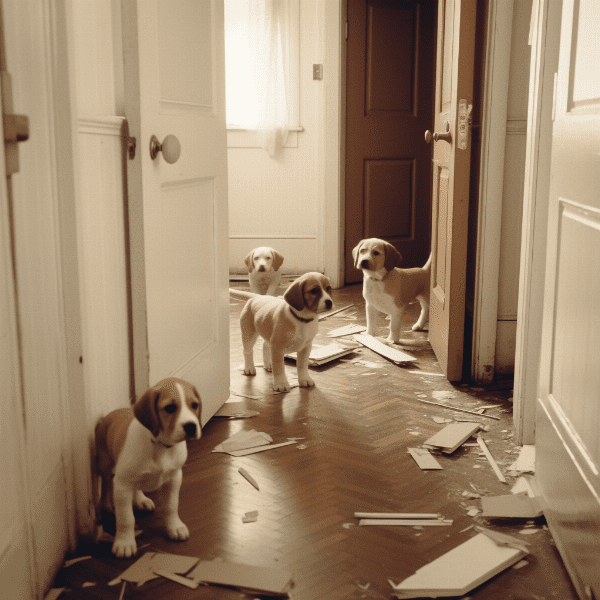
Causes of Separation Anxiety in Puppies
There are several factors that can contribute to the development of separation anxiety in puppies. Understanding these causes can help you take steps to prevent or manage your puppy’s anxiety.
Early Life Experiences
Puppies that have been separated from their mother or littermates too early or have experienced a traumatic event may be more susceptible to developing separation anxiety. This is because early life experiences can shape a puppy’s temperament and behavior.
Lack of Socialization
Puppies that have not been properly socialized or have not been exposed to different environments and experiences may also be at risk of developing separation anxiety. This is because they may not have learned to cope with the stress of being alone.
Change in Living Environment
Moving to a new home or a change in living environment can also trigger separation anxiety in puppies. This is because they may be unfamiliar with their new surroundings and may feel stressed and anxious as a result.
Lack of Routine
Puppies thrive on routine, and a lack of structure or changes to their daily routine can contribute to the development of separation anxiety. This is because they may not know what to expect and may feel anxious or stressed as a result.
Over-Attachment to Owner
Puppies that are overly attached to their owner or have not been taught to be independent may also be at risk of developing separation anxiety. This is because they may feel a strong sense of fear or panic when their owner is not around.
In conclusion, understanding the causes of separation anxiety in puppies is crucial for preventing and managing this condition. By identifying the underlying factors that contribute to your puppy’s anxiety, you can take steps to help them feel more secure and confident when left alone.
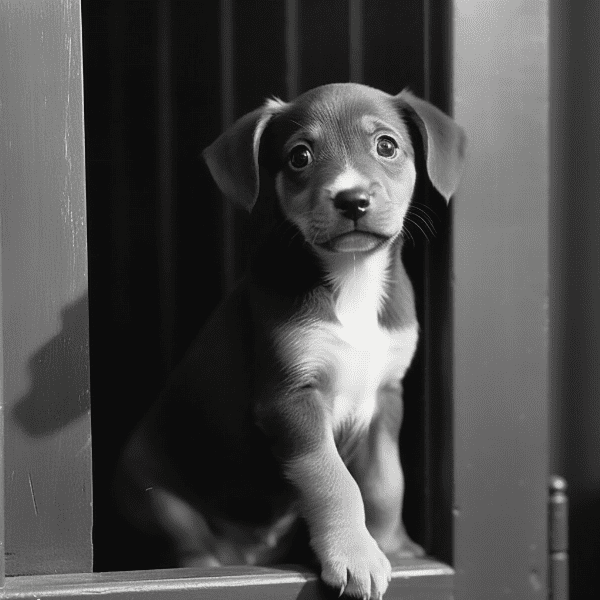
Prevention Tips for Separation Anxiety in Puppies
Prevention is always better than cure, and there are several things you can do to help prevent separation anxiety in your puppy.
Gradual Introductions
Gradual introductions to being alone can help your puppy feel more comfortable and secure. Start by leaving your puppy alone for short periods and gradually increase the time as they become more comfortable.
Create a Safe Space
Create a safe and comfortable space for your puppy to retreat to when they are feeling anxious. This can be a crate, a designated room, or a cozy bed. Make sure to provide plenty of toys, treats, and comfortable bedding.
Maintain a Consistent Routine
Maintaining a consistent routine can help your puppy feel more secure and less anxious. Make sure to feed your puppy at the same time each day, take them for regular walks, and maintain a consistent sleep schedule.
Socialization
Proper socialization can help your puppy feel more confident and less anxious when they are alone. Introduce them to different people, animals, and environments at an early age to help them develop coping skills.
Avoid Over-Attachment
Avoid becoming over-attached to your puppy and encourage them to be independent. This means not constantly showering them with attention and allowing them to spend time alone.
Positive Reinforcement Training
Positive reinforcement training can help your puppy learn that being alone is not a negative experience. Reward your puppy when they exhibit calm and relaxed behavior when left alone, and avoid punishing them for displaying signs of anxiety.
In conclusion, preventing separation anxiety in puppies requires a combination of gradual introductions, socialization, maintaining a consistent routine, and positive reinforcement training. By implementing these prevention tips, you can help your puppy feel more secure and confident when left alone.
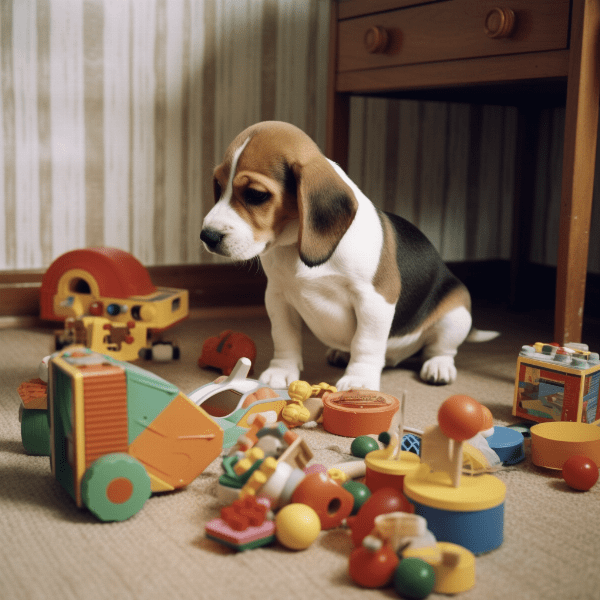
Training Techniques for Puppies with Separation Anxiety
Training your puppy to overcome their separation anxiety is essential for their well-being and your peace of mind. Here are some effective training techniques that can help.
Desensitization
Desensitization involves gradually exposing your puppy to being alone in a safe and controlled environment. Start by leaving your puppy alone for a few minutes and gradually increase the time as they become more comfortable.
Counter-Conditioning
Counter-conditioning involves teaching your puppy to associate being alone with positive experiences. This can be achieved by giving them a treat or a toy whenever you leave or arrive home.
Calming Signals
Calming signals can help to soothe your puppy when they are feeling anxious. These can include playing calming music, using a pheromone diffuser, or using aromatherapy.
Crate Training
Crate training can provide your puppy with a safe and comfortable space to retreat to when they are feeling anxious. Start by gradually introducing your puppy to the crate and rewarding them for entering and exiting.
Exercise and Stimulation
Regular exercise and mental stimulation can help to reduce your puppy’s anxiety levels. Make sure to take your puppy for regular walks, provide them with plenty of toys and playtime, and consider hiring a dog walker or pet sitter when you’re away.
Professional Help
In some cases, professional help may be necessary to help your puppy overcome their separation anxiety. This may involve consulting with a dog behaviorist or trainer, or seeking medical treatment from a veterinarian.
In conclusion, training techniques for puppies with separation anxiety involve a combination of desensitization, counter-conditioning, calming signals, crate training, exercise and stimulation, and professional help. By using these techniques, you can help your puppy feel more secure and confident when left alone.
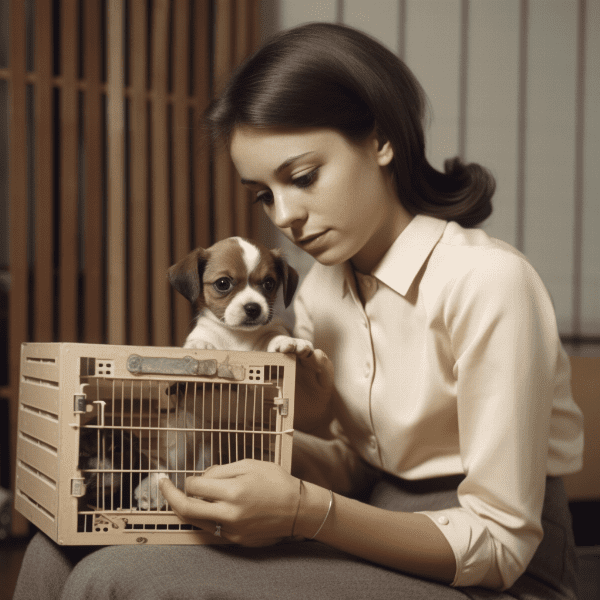
Medical Treatment for Puppies with Separation Anxiety
In some cases, medication may be necessary to help puppies with severe separation anxiety. Here’s what you need to know about medical treatment for separation anxiety in puppies.
Types of Medication
There are several types of medication that can be used to treat separation anxiety in puppies. These include antidepressants, anti-anxiety medications, and sedatives. The specific type of medication recommended will depend on your puppy’s individual needs and the severity of their anxiety.
Working with a Veterinarian
Before starting any medication, it’s important to work with a veterinarian to determine the best course of treatment for your puppy. Your veterinarian can conduct a thorough assessment of your puppy’s behavior and recommend the most appropriate medication and dosage.
Side Effects
Like all medications, there may be side effects associated with treating separation anxiety in puppies. These can include drowsiness, lethargy, and changes in appetite or behavior. It’s important to discuss any potential side effects with your veterinarian before starting medication.
Monitoring Progress
It’s important to monitor your puppy’s progress when using medication to treat separation anxiety. Make sure to keep a log of any changes in behavior, including improvements or potential side effects, and discuss them with your veterinarian.
In conclusion, medication can be a useful tool in treating separation anxiety in puppies. Working with a veterinarian, monitoring progress, and using medication in combination with other treatment techniques can help your puppy feel more secure and confident when left alone.
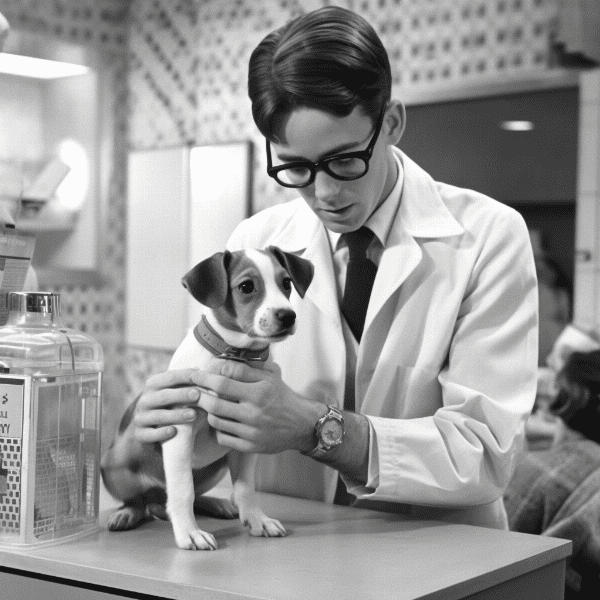
Coping with Separation Anxiety: Tips for Puppy Owners
Dealing with a puppy with separation anxiety can be a challenging experience. Here are some tips for coping with separation anxiety as a puppy owner.
Be Patient and Consistent
Dealing with separation anxiety can be a lengthy process, and it’s important to be patient and consistent in your approach. Stick to a routine, use positive reinforcement training techniques, and provide your puppy with plenty of love and attention.
Avoid Punishing Your Puppy
Punishing your puppy for their behavior is not an effective way to deal with separation anxiety. This can increase their stress levels and may even worsen their anxiety. Instead, focus on using positive reinforcement and reward-based training techniques.
Avoid Making a Fuss
When leaving or returning home, avoid making a fuss or showing excessive emotion. This can reinforce your puppy’s anxiety and may increase their distress.
Seek Support
Dealing with a puppy with separation anxiety can be overwhelming, and it’s important to seek support from friends, family, or a professional. Consider joining a support group for puppy owners or working with a dog behaviorist or trainer.
Take Care of Yourself
Dealing with a puppy with separation anxiety can be emotionally draining, and it’s important to take care of yourself. Make sure to take breaks, practice self-care, and seek support when needed.
Consider Daycare or Pet Sitting
Consider hiring a dog walker or pet sitter to care for your puppy when you’re away. This can provide them with companionship and stimulation, and can help to reduce their anxiety levels.
In conclusion, coping with separation anxiety as a puppy owner requires patience, consistency, and a willingness to seek support. By using positive reinforcement training techniques, avoiding punishment, and taking care of yourself, you can help your puppy feel more secure and confident when left alone.
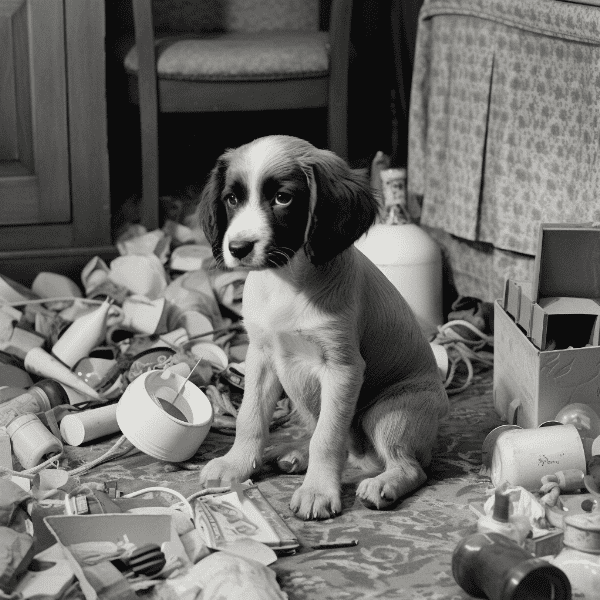
Understanding the Impact of Separation Anxiety on Puppies
Separation anxiety can have a significant impact on a puppy’s well-being and behavior. Here’s what you need to know about the effects of separation anxiety on puppies.
Emotional Distress
Puppies with separation anxiety experience emotional distress when left alone, which can lead to behavioral issues, including destructive behavior and inappropriate elimination.
Health Problems
Chronic stress associated with separation anxiety can lead to health problems in puppies, including digestive issues, immune system problems, and an increased risk of infection.
Aggression
In some cases, separation anxiety can lead to aggressive behavior in puppies. This can include biting, growling, and other aggressive behaviors that can be dangerous for both the puppy and their owner.
Decreased Quality of Life
Puppies with separation anxiety may experience a decreased quality of life due to their fear and anxiety. They may become withdrawn, lethargic, and may not enjoy activities that they used to.
Impact on the Owner
Separation anxiety can also have an impact on the puppy owner. Dealing with a puppy with separation anxiety can be stressful, and can lead to feelings of guilt and frustration.
In conclusion, separation anxiety can have a significant impact on a puppy’s well-being, behavior, and quality of life. Understanding the effects of separation anxiety can help you take steps to prevent or manage this condition, and ensure that your puppy is happy and healthy.
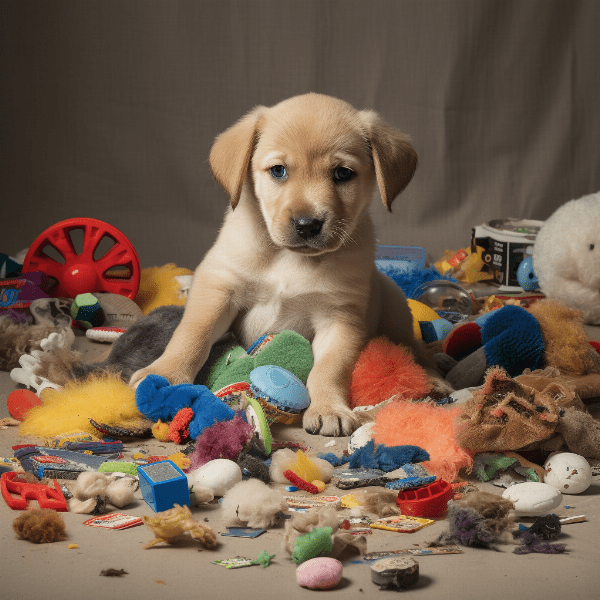
Seeking Professional Help for Puppies with Separation Anxiety
Dealing with separation anxiety in puppies can be a challenging and stressful experience. In some cases, seeking professional help may be necessary. Here’s what you need to know about seeking professional help for puppies with separation anxiety.
Consulting with a Veterinarian
Your veterinarian can provide you with advice and guidance on how to manage your puppy’s separation anxiety. They can also rule out any underlying medical conditions that may be contributing to your puppy’s anxiety.
Consulting with a Dog Behaviorist or Trainer
A dog behaviorist or trainer can provide you with specialized training techniques and advice on how to manage your puppy’s separation anxiety. They can also help you develop a personalized plan for managing your puppy’s anxiety.
Medication
In some cases, medication may be necessary to manage your puppy’s separation anxiety. Your veterinarian can prescribe medication and advise you on the appropriate dosage and side effects.
Combination Therapy
Combination therapy involves using a combination of medication and behavioral training techniques to manage your puppy’s separation anxiety. This approach can be particularly effective for puppies with severe anxiety.
Follow-Up Care
It’s important to follow up with your veterinarian or dog behaviorist regularly to monitor your puppy’s progress and make any necessary adjustments to their treatment plan.
In conclusion, seeking professional help for puppies with separation anxiety can be a crucial step in managing this condition. Consulting with a veterinarian, dog behaviorist, or trainer, medication, combination therapy, and follow-up care can all be effective in managing your puppy’s anxiety and improving their quality of life.
